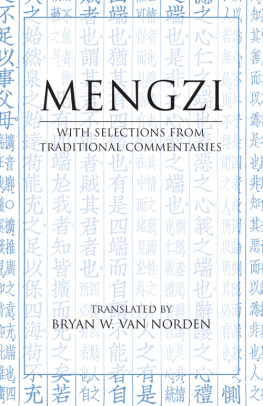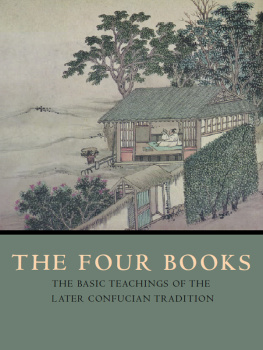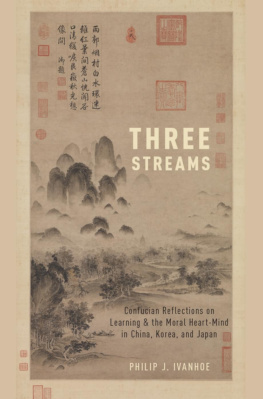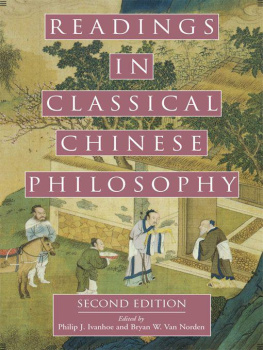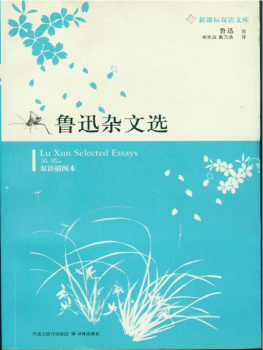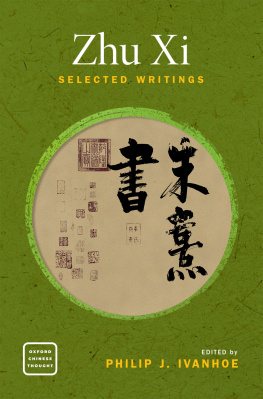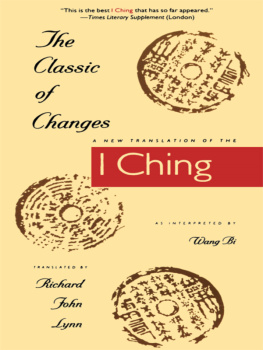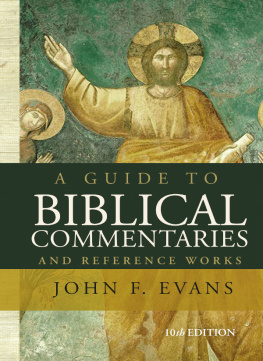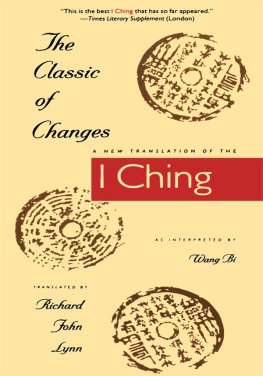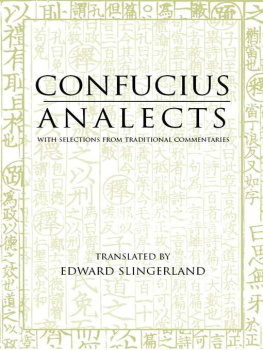
MENGZI
MENGZI
WITH SELECTIONS FROM
TRADITIONAL COMMENTARIES
Translated, with Introduction and Notes, by
BRYAN W. VAN NORDEN
Hackett Publishing Company, Inc.
Indianapolis/Cambridge
Copyright 2008 by Hackett Publishing Company, Inc.
All rights reserved
Printed in the United States of America
13 12 11 2 3 4 5 6
For further information, please address:
Hackett Publishing Company, Inc.
P.O. Box 44937
Indianapolis, IN 46244-0937
www.hackettpublishing.com
Cover design by Abigail Coyle
Text design by Carrie Wagner
Composition by Agnews, Inc.
Printed at Versa Press, Inc.
Library of Congress Cataloging-in-Publication Data
Mencius.
[Mengzi. English.]
Mengzi : with selections from traditional commentaries / translated, with Introduction and Notes, by Bryan W. Van Norden.
p. cm.
Includes bibliographical references.
ISBN 978-0-87220-913-8 (pbk.) ISBN 978-0-87220-914-5
1. Mencius. Mengzi. I. Van Norden, Bryan W. (Bryan William)
II. Title.
PL2474.Z6M36 2008
181.112dc22
2008026722
ePub ISBN: 978-1-62466-583-7
Readings in Classical Chinese Philosophy, Second Edition. Edited by Philip J. Ivanhoe and Bryan W. Van Norden.
Mengzi, The Essential Mengzi: Selected Passages with Traditional Commentary. Translated, with Introduction and Notes, by Bryan W. Van Norden.
Confucius, Analects: With Selections from Traditional Commentaries. Translated by Edward Slingerland.
Confucius, The Essential Analects: Selected Passages with Traditional Commentary. Translated, with Introduction, by Edward Slingerland.
For
Charles
and
Melissa
both Zengzi to my Zeng Xi

I first read Mengzi out of a sense of intellectual obligation. I was studying Chinese philosophy, and he is historically important, so I felt that I ought to be familiar with him. I found him somewhat intriguing but uninspiring. But the influence of three of my teachers at Stanford fundamentally altered my reading of Mengzi. First, Lee H. Yearley impressed upon me the hermeneutic principle that we must read classic texts carefully and charitably. Second, the work of David S. Nivison introduced me to the grammatical and lexical complexities of Mengzis Chinese. Third, Philip J. Ivanhoe taught me the importance of classical commentaries and how to read them. As a result, I changed not only my understanding of Mengzi but also my outlook on life. I have come to see the Mengzi as one of the treasures of world literature, easily in a class with Platos Republic, the Quran, and the Bhagavad Gita.
My own book began with a series of Comments and Corrections to D. C. Laus Mencius, which I first wrote in 1991 to help my students. Much of this was cribbed from my teachers classroom presentations as well as Nivisons On Translating Mencius. I gradually translated more and more portions of the Mengzi for use in my own classes. Then when Ivanhoe and I coedited Readings in Classical Chinese Philosophy, I finally was able to publish much of my work. However, I still hoped to produce a complete translation.
In order to provide something genuinely distinctive, I formulated the project of translating the Mengzi along with all of Zhu Xis commentary on it from his Sishu jizhu (Collected Commentaries on the Four Books). In 2005 I was awarded a National Endowment for the Humanities grant and a Fulbright Fellowship to work on completing this project while at Academia Sinica in Taiwan. Hackett Publishing gave me a contract to publish the resulting work. My editor at Hackett, Deborah Wilkes, has been immensely helpful at every stage, showing Confucian timeliness in knowing when to be patient and when to enforce {x} deadlines. At my request, she has offered substantive suggestions and repeatedly solicited outside feedback on drafts of the translation. Paul R. Goldin, Justin Tiwald, Stephen C. Angle, and several anonymous referees provided invaluable advice. As a result of their suggestions, I changed the project from a scholarly translation of the Mengzi with Zhu Xis complete commentary to a more idiomatic rendering with a commentary that is intended to make the work accessible to the general reader. I still frequently cite Zhu Xis commentary, but my primary aim is to elucidate the text for a contemporary audience. Harbour Hodder, my copyeditor, made suggestions that greatly improved the readability of the final draft. And, of course, I would be remiss if I failed to thank Confucius, Mengzi, Zhu Xi, and the countless others who have transmitted the Way down to us.
The commentary in this translation is primarily interpretive and historical. For grammatical and lexical notes on this translation, go to www.hackettpublishing.com and look under Title Information for Title Support Pages, which leads to a link to my detailed textual notes.
Conventions
Unless otherwise identified, quotations from commentary are from Zhu Xis commentary on the relevant passage in Sishu jizhu (Collected Commentaries on the Four Books).
The Pinyin Romanization system is used, except when quoting other English sources.
Dates are identified not as B.C. or A.D., but as B.C.E. (Before the Common Era) or C.E. (Common Era), meaning the era common to Christianity and the other great world religions. This is not intended to denigrate the importance of Christianity, but merely to provide a usage that is comfortable to adherents of other religions.
Passages in the Mengzi are identified by the standard divisions into books, parts (A and B in English), and chapters. I subdivide chapters into verses according to the places where Zhu Xi inserts commentary. Chapter and verse numbers are provided in the outside margins of the translation. In this ebook the marginal numbers are enclosed in square brackets and embedded in the text.
The translation is often functional rather than literal. For example, li, an ancient unit of length equivalent to about a third of a mile, is rendered league, while other units are rendered foot, pound, etc.
{xi} When used in a proper name, or when referring to someone Confucians would consider a genuine monarch, King is capitalized. When referring to someone who merely happens to have usurped the title, king is in lowercase.
When used as a translation of the Chinese term d, Virtue is capitalized. When used in a more general sense to refer to good traits of character, virtue appears in lowercase.
Quotations of Kongzi (Confucius) are identified by the Analects passage in which they occur (following the sectioning in Edward Slingerlands translation, Analects with Selections from Traditional Commentaries). If no citation is given, Mengzi is attributing to Kongzi a quotation not found in the received text of the Analects. Passages from the Odes are identified by their numbering in the standard Mao edition. (On the Odes, see The Confucian Way in the Introduction.)
In the commentary, Zhu Xi is referred to in the present tense (e.g., Zhu Xi says ), while earlier commentators whom Zhu Xi cites are referred to in the past tense (e.g., Yin Tun commented ).
There is a bibliography accompanying the Introduction. Consequently, citations of works in the commentary are abbreviated to the authors surname, the title, and the pages cited. Complete bibliographical information is supplied in footnotes for works not mentioned in the Introduction.
Next page
